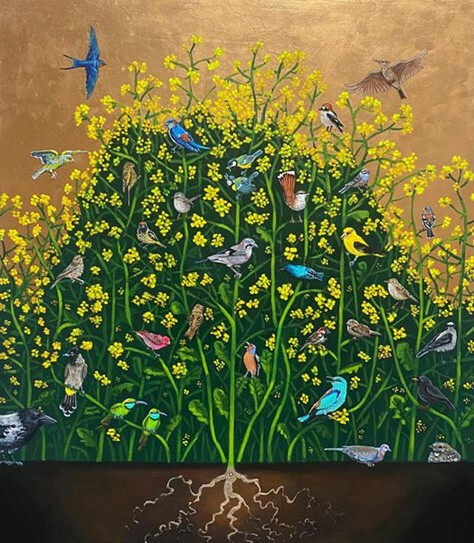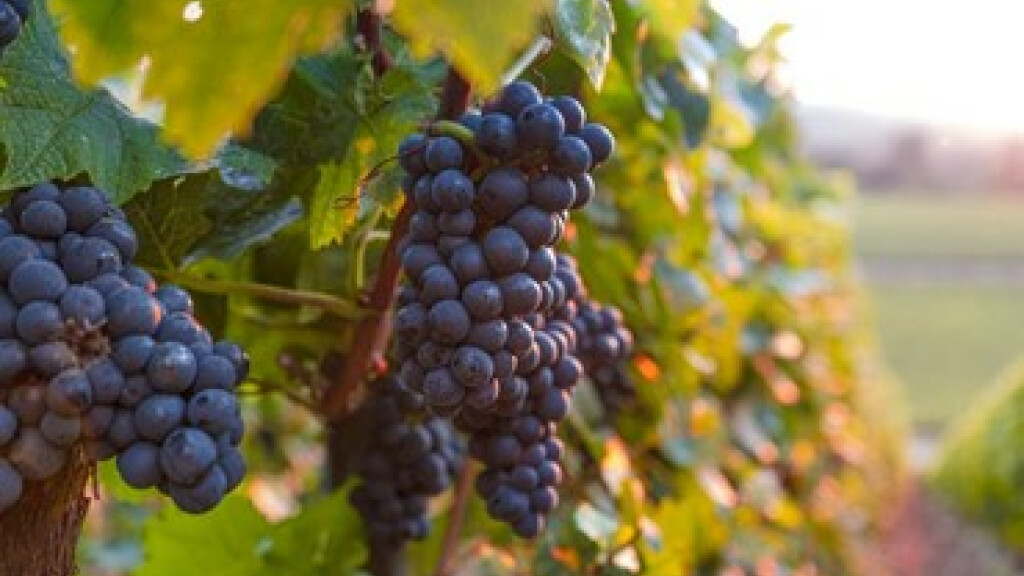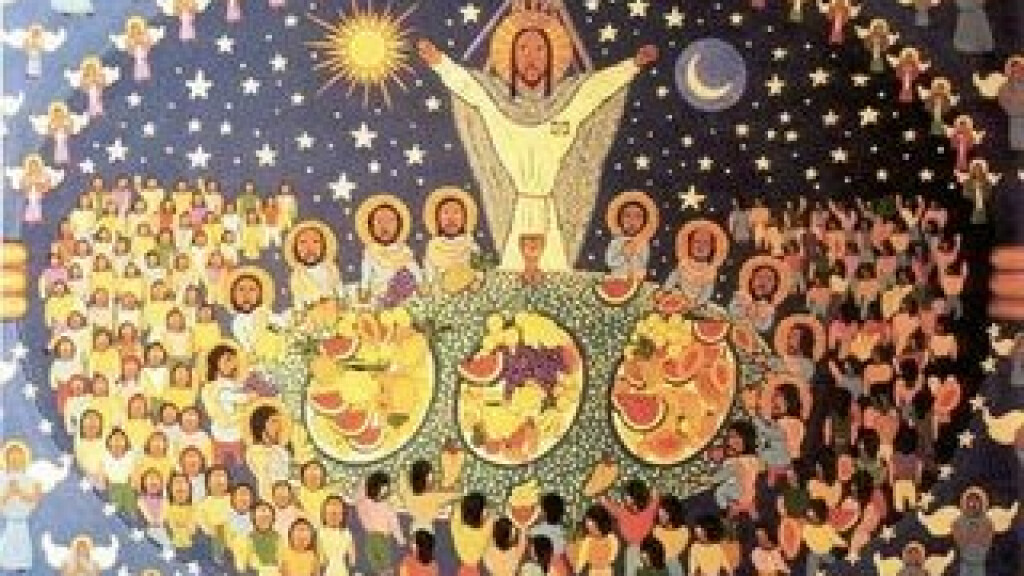October 08, 2023 | Rev. Loren McGrail
Become God’s Worms
Matthew 21: 33-46
Rev. Loren McGrail
Holmdel Community United church of Christ
October 8, 2023
Now when the owner of the vineyard comes, what will he do to those tenants?” They said to him,
“He will put those wretches to a miserable death and lease the vineyard to other tenants who will give him the produce at the harvest time.”
Jesus said to them, “Have you never read in the scriptures:
‘The stone that the builders rejected
has become the cornerstone;
has become the cornerstone;
this was the Lord’s doing,
and it is amazing in our eyes’?
and it is amazing in our eyes’?
Jesus is mad, angry mad. He is particularly angry at those who govern, hold authority over others, or are responsible for God’s vineyard.
This is the third parable about vineyards. It is again directed to the religious authorities who are responsible for the overall welfare of God’s people.
This is a shocking parable for the graphic violence it depicts. Most translations call it the Parable of the Wicked Tenants. However, Dear Ones, it is also a parable about the violence of an unjust economic system. Therefore, it is a parable about what the kin-dom is not. Finally, it is about the nonviolent Jesus pointing the way to a different world ordering based on justice and respect for all.
I would like to review with you the traditional way this parable has been understood and then share another view, one that takes into account the social economic conditions of first century Palestine.
The traditional understanding of this parable has the vineyard owner as Yahweh and the vineyard as Israel, God’s people. The tenants are the Jerusalem authorities who are rebelling against God and killing God’s servants, his prophets. They also kill his only heir, his son. Jesus of course is the son. Jesus is also identified as the rejected cornerstone. To bear good fruit, you must accept him otherwise there will be dire consequences. God, the vineyard owner left vineyard-- the fertile place to beloved tenants. Instead of caring for the vineyard, however, the tenants violated God’s trust. Matthew’s tenants turned into cheaters, thieves, and murderers — to the point of killing the vineyard owner’s son.
As we have seen already, there are problems when we read the vineyard owner as God and the Jewish authorities as the ones who kill God’s prophets. This and other parables like it have been used to incite Christian mobs to commit acts of violence against Jews for centuries.
Let’s turn to another way to understand the parable. Let’s begin by reviewing landownership in first century Palestine and look through Galilean eyes. Who were vineyard owners? They were the wealthy elite who could wait 7 years for their first harvest. They were people who could afford to be vineyard owners and had the means to export their product to the Roman occupiers. How did they get their land? It was acquired by taking it through foreclosure on loans to peasant farmers who couldn’t pay back the loans due to high taxes and tithes to the Temple in Jerusalem. Peasant farmers often lost their lands and became landless tenants on the land they used to grow their crops on for their families.
I suspect that a first century Galilean audience might not all agree that the tenants were wicked. Some might even find their behavior understandable but not prudent because the authorities would be sure to extract vengeance.
I chose the story about poor white sharecroppers for our contemporary reading this morning because it illustrates that sharecropping in any age or place has economic injustice built into the system. This system of economic development, Dear Ones, is a form of structural violence.
It precedes the violence of the tenants. It was true in first century Palestine, and it was true in the rural south for Whites and Blacks.
In preparation for my Civil Rights Pilgrimage, last week I participated in a zoom simulation called Racial Wealth Gap developed by Bread for the World. We were given racial identities---Black or White and then were told how various kinds of legislation affected our economic status. The first card was Andrew Jackson’s Land policies. Does anyone know what they were? After the Civil War, freed slaves were promised 40 acres and a mule. In 1865 the federal law was rescinded leaving less than 1% of African Americans eligible to own their own land and not face debts. 4 million had to become sharecroppers often on lands where they had been slaves. This system of sharecropping tied the farmers to their former masters because they had to also sell their crops to him at less than market prices.
Economic systems that keep people impoverished is a form of violence. People who extract money from tenants on behalf of the owners are part of the system of exploitation too. It is not surprising then that they too would be thwarted or attacked.
If the vineyard owner is not God, then his son is not Jesus. In First Century Palestine if there was no heir, the land would go to the tenants. The killing of the heir was most likely perceived as a win for the tenants. Violence is justified if it brings freedom. This is not what the kin-dom of God looks like.
So why is Jesus telling us this story? And where are we in the story? Are we the vineyard owner living off others? Are we the tenants toiling away with no chance to get ahead except by acts of violence?
None of the above. I believe we are like those ‘slaves” or “stewards” sent to collect the money. We are caught in the crossfire between the master’s greed and excessive demands and the angry tenants or debtors with endless complaints. We have some privileges yet are also subservient to an economic system that both benefits and victimizes us. We are in the middle of the cycle of economic exploitation and the spiral of violence.
This is where we meet the nonviolent Jesus. Jesus does not condone the violence of the tenants nor the economic violence of the landowner. He does not support vengeance from either side. Jesus stands at this intersection and calls for an end to violence. Neither group are producing fruits from God’s vineyard for God’s kin-dom.
Jesus, the cornerstone is rejected because he does not support a system of violence that allows people to exploit others for financial gain. Furthermore, he also does not support violence as righteous revenge. There is no such thing as redemptive violence.
I wish to pause here this morning and invite you to reflect and pray for all who are caught in this cycle of violence in Palestine and Israel today.
We have been viewing the violent acts of the tenants against the vineyard owners on our news and now the counterattacks from ruling authorities. I invite you to remember that the spiral of violence began off screen with a land theft that happened years ago and an illegal siege on Gaza that is in its 15th year. This violence reached another boiling point with promised attacks on Al Aqsa, Islam’s second holiest site.
Dear Ones, Jesus is there in Jerusalem again warning for all who have ears to hear that violence can never stop violence and war is never the answer. Jesus was rejected for this message, yet it is the cornerstone of our faith, to love even those who persecute you.
Dear Ones, if we wish to work in God’s vineyard and produce the fruits of God’s kin-dom, we must begin by remembering that we are all God’s tenants or sharecroppers. Let us remember too what Mahatma Gandhi said, “Earth provides enough to satisfy everyone’s need, but not everyone’s greed.”
Dear Ones, let us work together to stop the vicious cycle of greed. We are not owners of the land. We were never meant to be. We produce the fruits when we represent God’s interests, which include equity and justice for all; when we work for peace, not the continuation of violence or war.
I’d like to end with this poem by the Sufi poet, Rumi, called the Worm’s Waking:
This is how a human being can change:
there's a worm addicted to eating
grape leaves.
Suddenly he wakes up,
call it grace, whatever, something
wakes him, and he's no longer
a worm.
He's the entire vineyard,
and the orchard too, the fruit, the trunks,
a growing wisdom and joy
that doesn't need
to devour.
there's a worm addicted to eating
grape leaves.
Suddenly he wakes up,
call it grace, whatever, something
wakes him, and he's no longer
a worm.
He's the entire vineyard,
and the orchard too, the fruit, the trunks,
a growing wisdom and joy
that doesn't need
to devour.
Series Information









